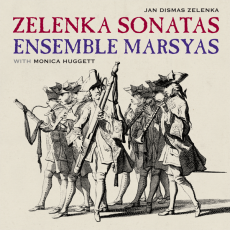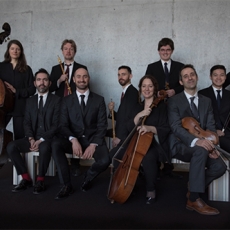Ensemble Marsyas - Zelenka Sonatas - Music Web International
This is Edinburgh-based award-winning Ensemble Marsyas' debut recording
for Linn, and contains three of Bohemian composer Jan Dismas Zelenka's set of
six trios for violin, two oboes, bassoon and continuo, played here on period
instruments. These sonatas are noted for their technical demands for wind
instruments, and from the outset it is easy to hear why. The opening Allegro
of the Sonata V in F Major is an almost seven minute non-stop barrage of
notes of remarkable intensity for the period - a very pleasant and amicable
barrage, but a continuous onslaught none the less - a sort of Brandenburg
Concerto for minimal forces.
Zelenka is a name perhaps not at the top of your Baroque composers list, but
recordings are increasingly showing the range of his remarkable music,
including a terrific Officium defunctorium and Requiem on the
Accent label. It is in fact the Accent label which brings is our main competitor, with a 2CD complete set of the
sonatas from 2005, ACC30048. Comparing that Sonata V shows a lower tempo
and a gentler feel to the recording in this Accent set, and timings are
consistently though not always extremely longer, movement for movement. Set in
a bigger acoustic and at a slightly more distant perspective, the complete set
has a more genteel sensibility while Ensemble Marsyas is more direct and
exciting - still refined and beautifully transparent of sound, but with greater
impulse and energy. There's a delicious descending chromatic scale from the
flute in the final Allegro of Sonata V, and this is made much
more of a feature on the Linn disc - listen at 1:29 and marvel, it's a wee
shocker.
Monica Huggett joins in with an expressive violin part in the four movement Sonata
III in B-flat Major, and her lines add an extra dimension to the winds in a
piece which splits the programme nicely. The bassoon is put through its paces
in the second movement Allegro while the oboe and violin have a genteel
conversation above. The third movement Largo has a witty rhythmic tic,
like Michael Palin's not-silly-enough-for-a-government-grant silly walk, and
the oboe glissando at the end is another naughty delight. The minor-key Sonata
VI is another superb piece, with the expressive lines and suspensions made
the most of by the Marsysas oboes. The harpsichord is given a rest here, a
theorbo adding depth and resonance, a small organ filling out harmonies almost
as a kind of secret mission of goodwill. The final track is a recently
discovered gift from Dresden, a set of parts from a Simphonie already
known from an autograph score from 1723, but as interpreted by a copyist. This
is a lovely encore, once again with violin, and showing Zelenka delighting in
the independence of instrumental sonorities and timbres, with only the final
cadence leaving us in anticipation of another movement which never comes. With
only 50 minutes on the clock I would argue a solution for this loose end of
tonality might have been found without too much difficulty. Either way, anyone
with an ounce of programming sensitivity would have placed it as a prelude to
the Sonata V in F minor which it fits perfectly, but this is a minor point.
Just don't expect to be able to rise from your bed and complete the cadence on
the piano - the tuning here is A = 415 hz.
The recording of this Linn disc is very nicely balanced, with the harpsichord
adding just the right amount of crisp rhythmic and harmonic support without
being particularly high in the mix. The SACD effect adds more dimensions to the
sound and shows up some of the lower level inner sounds more, but this is still
a lovely recording in straight stereo. If you want the entire set of Zelenka's
sonatas then that Accent release is very good, but with all of those delightful
details and a marvellous sense of expression and youthful freshness I prefer
Ensemble Marsyas in a note-for-note comparison.

